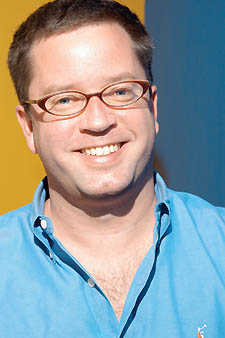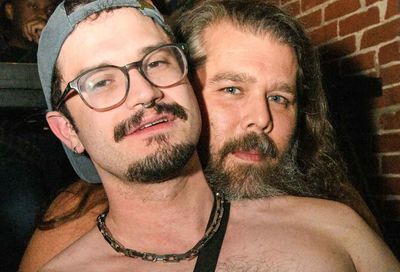Marching Forward
How the war affects gays in the military and a review of current policy by SLDN Director C. Dixon Osburn
“I think SLDN has achieved more in ten years than anyone would have dared hope for,” says C. Dixon Osburn, executive director of the Servicemembers Legal Defense Network. “We’ve been able to obtain 35 changes to federal policy and practice, which is extraordinary when you think this is an issue we lost big ten years ago.”
Given the magnitude of the loss in 1993, the change in public and political attitudes towards gays and lesbians in the military is a major accomplishment. When the newly elected President Bill Clinton pledged to end discrimination against gay servicemembers, it set off a firestorm of opposition among both Democrats and Republicans and ended with the implementation of the notorious “Don’t Ask, Don’t Tell” policy, a compromise that actually increased the number of gays and lesbians kicked our of the military and gave rise to a wave of anti-gay harassment.
It was in those days of political battle that Osburn, fresh from Georgetown law and business school, began working with the Campaign for Military Service (CMS), a coalition group formed to advocate for gay military service. And it was at CMS that he met Michelle Beneke, who with him would form SLDN to help gay and lesbian servicemembers who were “left out on a limb” by the federal policy, and prepare the community for an eventual victory on military service.
 Osburn |
Just over a decade later, Osburn, 39, is still leading the organization’s charge. With the country in the midst of its largest military mobilization in decades, SLDN is finding more and more servicemembers coming to them for help.
“The requests for assistance we receive have continued to go up,” Osburn says. “They went up ten percent last year to 991 requests for assistance. This year we’re projecting and are on track to receive 1,100 requests for assistance.”
The country once more focused on a flashpoint of gay and lesbian equality in the battle over marriage. At the same time, the war on terror has focused the country’s attention on the results of “Don’t Ask, Don’t Tell,” including the discharge of soldiers such as Arabic linguists and. With a majority of Americans now supporting open gays and lesbians serving in the military, Osburn and SLDN believe the time is soon coming to make “Don’t Ask, Don’t Tell” a thing of the past.
METRO WEEKLY: Looking back, is there anything that you think could have been done to change the outcome of the Gays in the Military fight in the 1990s that would have avoided “Don’t Ask, Don’t Tell”?
C. DIXON OSBURN: I believe that we could not have changed the outcome back in 1993 because of where the executive branch was, where the Pentagon was, where Congress was, and where our community was. In realpolitik terms, individuals of power are going to win and the two people who had the most power were Sen. Sam Nunn, who was chairman of the Senate armed services committee, and Gen. Colin Powell. In the eyes of the American public, their words carried an awful lot of weight — and they spoke a lot. Bill Clinton spoke once in January [of that year], and essentially said nothing after that.
One thing that people argue could have been done is Clinton could have signed an executive order just like he did on other issues the first day he was in office. It’s not clear to me whether or not Congress would have worked actively to repeal it. People like Nunn say they absolutely would have, so even then I don’t know if we would have won. But that’s the only way that it could have been done, if Clinton had actually issued that executive order and stared down his opponents at the outset.
MW: Clinton critics have pointed out that discharges went up under “Don’t Ask, Don’t Tell,” and put a lot of the blame for that on him. Do you think that’s a fair assessment of it? Or do you think the Republicans should take a fair share of the blame?
OSBURN: I think that both parties should be able to agree that “Don’t Ask, Don’t Tell” is wrong and that it hurt the military. We’ve lost 10,000 servicemembers in ten years, which is equal to two army brigades. We’re losing critical talent. The discharges did go up under Clinton in a pretty dramatic way, to levels that characterized the discharges during the 1970s and 1980s. They didn’t reach levels that were unprecedented, but the problem is that Americans bought what Clinton told them. He said the policy was “a major step forward.” The view in the American mind was that “Don’t Ask, Don’t Tell” was somehow a benign gentleman’s agreement, and if you were discreet and quiet you could lead your life and serve your country and all would be well. That isn’t what the law said, that isn’t what the Department of Defense regulations said. Those of us on the inside knew very well that this was another wolf in sheep’s clothing, and we predicted that the discharge numbers would go through the roof again, which is exactly what happened. Harassment reached epidemic levels and continues to be a horrendous problem in the military. You can’t tell your psychiatrist that you’re gay because there’s no confidentiality. You can be turned in by your mom or your dad if they don’t like the fact that you’ve just come out to them. This policy is a far cry from a benign gentleman’s agreement.
I think that that all finally hit home in a very gut-level way when Barry Winchell was murdered in 1999. Here’s a soldier who was the Army’s dream: 21-years-old, bright as anything, able to assemble and disassemble machinery, wanted to become a helicopter pilot. And he was somebody who was struggling with his sexual orientation. We don’t know what he would have ultimately determined on that path, but he was being harassed every day for four months for being perceived as gay. He was dating a girlfriend who was transgender at the time. He told friends, “I don’t know what to do about this, because if I complain about it I’m going to get discharged, and this is my dream job.” He was murdered by two soldiers. That brought home to the American people that there’s no illusion that “Don’t Ask, Don’t Tell” is a benign policy or a good policy. It’s one that can lead to the murder of fellow Americans.
MW: While “Don’t Ask, Don’t Tell” has stayed in the media over the past ten years or so, with higher interest at some times than others, marriage has really become a burning national issue with actual marriages taking place and the proposed constitutional amendment. Is it harder now to get people to feel the urgency of the fight for gay and lesbian military service?
OSBURN: Most polls, even in our own community, put the military as one of the top issues on people’s minds. I think it’s something that still resonates with our community. It also tracks with something that’s going on in the larger community of America, where the last Gallup poll in December said that seventy-nine percent of Americans support gays serving openly in the military, up from fifty-seven percent back in 1993. There’s been a huge shift of support in our favor, and I think that’s an indication of the work that we’ve been doing, as well as the changing climate in America over the past decade.
Getting people involved requires there to be a hook for them to get involved, which usually means there’s a bill pending in Congress. One of the things we have to do for our next stage of growth at SLDN is to look for the opportunity to drop a bill to repeal “Don’t Ask, Don’t Tell.” We are going to work hard in Congress to educate them about why it’s time for them to do that. You haven’t had a moment in time like you did in 1993, and you don’t have a moment in time like you do now on marriage, but there actually is more momentum on “Don’t Ask, Don’t Tell” than at any time in the last ten years. We have two generals and an admiral who just came out as gay, the highest ranking officers ever to do so. We have the Gallup Poll showing the most support by the American public ever and members of Congress who are beginning to get active on this.
That momentum is coupled with the opportunity presented by Lawrence v. Texas, the Supreme Court decision that struck down the state sodomy statutes. The military has a sodomy law as well, and so it’s currently being litigated whether or not Lawrence applies to the military. That has some very profound implications for the military and for “Don’t Ask, Don’t Tell.” So we’re at the point where there are going to be moments in time again when people are going to be very active and involved on this issue.
MW: Although public opinion has moderated on the issue as reflected in the Gallup poll you mention, you’re faced with a Congress that’s not necessarily moderate but has actually become more polarized. Is it actually harder now because of that polarization to get something through Congress even with public opinion behind you?
OSBURN: The Congress has become more polarized over the past decade, and some would posit that the Congress in 1993 that passed “Don’t Ask, Don’t Tell” was much more amenable to us than the one that exists today. There is a huge challenge there. [But] there are an increasing number of members who think harassment for any reason is wrong and it should stop. An increasing number of them see the connections between that harassment and a federal law that says it’s okay to treat people as second class citizens. There are an increasing number of them who [respond to] the issue of military necessity, that we cannot fight a war on terrorism on multiple fronts while losing talented individuals like Arabic linguists when the Army says that they have a fifty percent shortage of trained linguists.
MW: You’re working for gay and lesbian civil rights essentially, an issue very much associated with the left, and you’re doing it for an issue involving warfare and military, which is traditionally not an element of the progressive left. Is that a hard sell for the gay community itself, when there is a significant progressive wing that’s opposed to war in most, if not all, circumstances?
OSBURN: I think that there are different messages that resonate with different segments of our community and with America. There are some people who understand that this is a basic civil rights issue, and are willing to rally behind us on that. There are people who understand that women are disproportionately hurt by this policy, kicked out at twice their presence in the military. The people that get that this is a youth issue and a class issue, that those who are disproportionately harassed are 18 to 25 years old, that those who the military draws into service today are predominantly from lower middle class to lower income backgrounds. There are other people for whom the military necessity issue resonates, and people who understand this as an issue of patriotism, that we are brave, strong, courageous Americans just like everyone else.
MW: Some people argue that as the older members of the military leave the services, and the younger generation moves into positions of authority, the military will become more accepting. But it seems the physical and verbal harassment comes from people’s peers.
OSBURN: On the issue of harassment, I think it is set by the command climate, so those who are in charge who either engage in it or tolerate it are allowing it to continue. When you have a law that says gay people are a separate class of people and deserving of unequal treatment, I think that engenders harassment as well. I also agree with the other point that you made, which is that the culture of the military itself will continue to evolve and change. Of the servicemembers who are 18 to 25 years old who are interviewed about “Don’t Ask, Don’t Tell,” the vast majority question why the policy even exists. They are part of the generation that has grown up in the past decade much more accepting of gays, lesbians and bisexuals. They have friends who are gay, they have parents who are gay, they watch television and see positive images of our community being portrayed. These are the people who will be our future leaders, and are certainly going to be a lot more tolerant of gays and are going to set a very different command climate than the one that’s being set today.
MW: When SLDN gets calls from servicemembers, what are the primary things that you’re hearing? What’s the most common expression of harassment?
OSBURN: The calls that we’ve received actually track with what the Pentagon itself found. The Department of Defense Inspector General surveyed 75,000 servicemembers in 2000 and found that 80 percent of those responding had witnessed or experienced some form of anti-gay harassment. Five percent had experienced or witnessed physical assaults. The vast majority of harassment in percentage term is anti-gay epithets, anti-gay graffiti up on the wall, the degrading banter and chatter calling people dyke, queer and faggot. But the fact that five percent of our armed forces experience or witness some form of anti-gay physical harassment is profound is astounding. And it forced the Pentagon for the first time to admit that they had a problem and that it had to be stopped. We’ve been working very hard every year to try to make sure that they do better on the anti-gay-harassment guidelines that we helped create. The calls and requests for assistance that we receive track that. It’s very difficult — imagine yourself being 18 or 19-years-old, you’re just coming out to yourself, and you don’t know who you can trust because they’re all saying “faggot” and “kill queers.” They come to us seeking guidance on what they can do to protect themselves. We have people who face horrible harassment. We had a servicemember who had a grenade attached to his door with a death threat. We’ve had people who have woken up in the morning to find that they’ve been stripped naked and anti-gay epithets had been written on their body. We have people who live in mortal fear.
MW: With a decrease in discharges during the current war effort, are some people feeling more comfortable now that they can stay in the service or are they fearing that that’s going to change again soon?
OSBURN: The historic trend has been that during war gay discharges have dropped precipitously and during peace gay discharges have gone up dramatically. It’s been true for Korea, Vietnam, that Persian Gulf, and it’s true again today. In the last two years, discharges have dropped thirty-nine percent. I certainly have a fear that if combat were to end tomorrow that the gay discharges would escalate. The crystal ball suggests, however, that our troops are going to be deployed for a very long time. I suspect that the gay discharges will continue to drop — that is just my prediction. We are still awaiting to hear from the veterans who will return from Iraq to find out more about their experience, and whether or not they’ve been able to be open or not, whether or not they will be able to stay in the service longer. That’s an open question. One thing that often gets lost in the debate is that there are approximately 10,000 lesbian, gay and bisexual servicemembers in the Middle East right now, and they are enormously patriotic, brave Americans who are sacrificing their lives because our country has asked them to do that. We need to give them many hurrahs and wish for their safe return.
MW: With marriage mobilizing the gay and lesbian community and its allies in a big way, do you expect any sort of coattail effect that would increase activism to repeal “Don’t Ask, Don’t Tell”?
OSBURN: I think that there are a lot of gays, lesbians and bisexuals who have not been active on any issue before, and are mobilizing on marriage because they realize what is at stake for them and their loved ones. And when people become active, they often become active on more than one issue, and they become active for more than just one month. I subscribe to the view that this is going to help the LGBT community on all the issues that we are facing.
Is there a synergy between marriage and military? My view is that these are indeed the two most important issues facing this community. Marriage and military issues at both the federal and state level really set the terms for equality for our entire community. If you want issues that truly seep into everyday family life, it is military service — twenty-five percent of all Americans are veterans — and marriage. These are issues that really go to the cultural transformation of America. That’s why I think these are two of the most important issues facing us right now.
SLDN’s second annual lobby day will bring veterans and activists to congressional offices May 23-25. And Saturday, May 22, a Military Ball at the Hamilton Crowne Plaza will honor LGBT veterans and allies, with proceeds benefiting SLDN and the American Veterans for Equal Rights (AVER). Tickets are $75. For more information visit www.sldn.org or call 202-328-3244.
Support Metro Weekly’s Journalism
These are challenging times for news organizations. And yet it’s crucial we stay active and provide vital resources and information to both our local readers and the world. So won’t you please take a moment and consider supporting Metro Weekly with a membership? For as little as $5 a month, you can help ensure Metro Weekly magazine and MetroWeekly.com remain free, viable resources as we provide the best, most diverse, culturally-resonant LGBTQ coverage in both the D.C. region and around the world. Memberships come with exclusive perks and discounts, your own personal digital delivery of each week’s magazine (and an archive), access to our Member's Lounge when it launches this fall, and exclusive members-only items like Metro Weekly Membership Mugs and Tote Bags! Check out all our membership levels here and please join us today!























